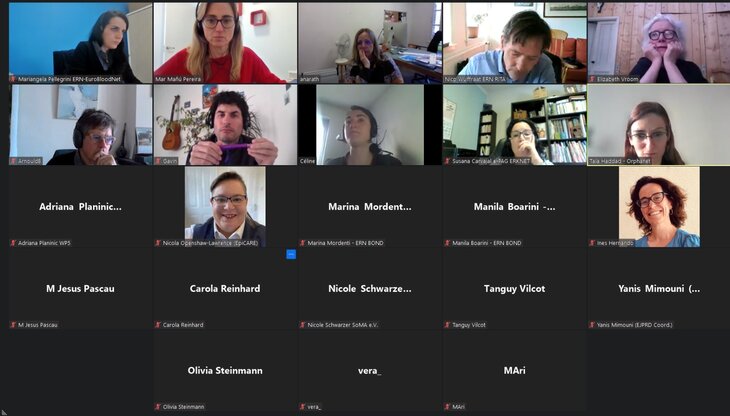Kick-off meeting of ERICA WP3 Patient Centred Expert Working Group

On the 8th and 10th of March it has been held the Kick-off Meeting of the ERICA WP3: during the 2 sessions the team and participants have discussed about PROMs for Rare Diseases and how to build an accessible repository.
The general framework of the ERICA project' WP3 is Patient Centered Research for Rare diseases. WP3 is led by Ana Rath and María del Mar Mañú Pereira, respectively from Orphanet and ERN-EuroBloodNet, in collaboration with MAPI Research Trust.
Specifically, the WP3's key goal is to promote and disseminate in Europe the adoption of standardized Patient Reported Outcome Measures (PROMs) for rare diseases while ensuring the involvement of the ERNs Health care providers and RDs patients organizations in this process.
WP3 aims concretely to facilitate via the creation of the repository of existing PRO and ObsRO for rare disease the use of those standardized tools that consider patients and caregivers' perspectives in reporting health outcome measures and in the health assessment decision-making process for rare diseases.
Accordingly, the WP3 team would like to reach the following achievements:
- to create a central repository of (validated) common and domain-specific RD PROMs for ERNs
- to define priority areas for future PROMs development
- to support ERNs in the adoption of validated instruments for PROMs
During the ERICA WP3 'Patient centred research', the Expert Working Group Kick-off Meeting was presented during the first part, the action plan to the Expert Working Group and participants. Specifically, it has been described the Questionnaire Database Presentation - PROQOLID, the Orphanet Disability questionnaire (ODQ questionnare available here and here), and the strategy for the RD Clustering, Questionnaire Coding and PROs selection.
Whereas during the second part of the meeting, an interactive exercise has allowed to tackle some needs for the use of PROMS repository, the ideal context of use of RDs PROMs, the expected search engine terms to be inserted in the repository and the expected results.
Results of this exercise are under analysis and will be used for customizing the repository of existing PRO and ObsRO for Rae Disease adapting it as much as possible on expressed needs and expectations.
